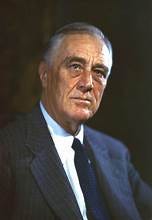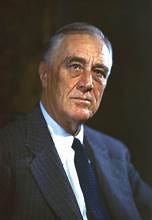Franklin Delano Roosevelt died on April 12th, 1945, and with that death, the driving vision behind the New Deal died, a deft political leader died and the most democratizing voice in our presidential history died. We, as a democratic society, still suffer from that loss.
Context
After the early formation of our nation, business interests were in control of much of the governance, with some deviation during the Civil War and some adjustments under Theodore Roosevelt. However, by the end of the 1920s, the unregulated business interests simply went too far, and the entire economy seemed to be in freefall. And that is when a new kind of leader stepped in, a leader whose concerns were not only about the economic needs of the financial elites, but also about the needs of the ordinary citizens who had suffered under the control and indifference of that economic elite.
New Deal
With a change of focus to include the welfare of the ordinary citizens instead of the primacy of business interests, the New Deal was born. It consisted of trying new approaches to solving social and economic problems and invited in a new constituency, some academic, but also the ordinary citizens, voices that included people who saw the American experience from different perspectives. It allowed old issues to be viewed with fresh eyes.
FDR, with that approach shepherded the nation through the Depression of the 1930s and through World War II in the early 1940s. And much of what looked like social and economic progress to most ordinary people, was anathema to the economic elite whose power and control had been greatly diminished. They had a strong sense of entitlement, that their wealth, their social status, their educational superiority should make it clear to everyone that they should be making the important decisions, and those decisions should certainly not be turned over to the ordinary unwashed and unschooled citizenry.
By the end of his presidency, that economic elite was regaining their balance and beginning to attack the democratizing forces of the New Deal, especially in the Supreme Court. The economic elite wanted to regain their prominence and were creating plans to accomplish that goal. The industrial needs of World War II, help reinstate corporations to their past positions of power and dominance.
After FDR
After FDR’s death Truman took over, and although he did not have FDR’s clear social and political vision, nor did he have FDR’s political savvy, he was a champion for New Deal policies. Without FDR’s diplomatic ability, and negotiating expertise, necessary to deal with Russia, the Cold War develops, creating a world of hardened tensions and eventually, an arms race, making the Military-Industrial-Complex a major player. Truman did quite admirably against the rising attacks of the conservatives of the economic elite, but the rise of anti-communism in the US was an easy tool for the Republicans. They used that tool to attack the democratizing elements of the New Deal under the pretense that all unions and other groups involved in social action were a road to communism and not part of the underpinnings of a democratic society, which was to give workers and ordinary citizens a participatory voice in governance and direction.
The movement of that economic elite continued under Eisenhower and with the brief exception of the democratizing influences of JFK (stopped by assassination in 1963), by 1968, that economic elite had reclaimed dominance once again. That dominance continues into the present day.
Although elements of FDR and the New Deal continue to be a positive part of our modern society, most of the current emphasis is on economics and taking care of an economic elite. If you doubt that, just look at the enormous, and growing, income inequality and the increasing number of billionaires, soon to be trillionaires.
FDR, we could use your wisdom and astute political mind now.







Hi, Bob - Thanks for the excellent reprise of the shift in American economic and social priorities "shepherded" by FDR.
Former New York Times Washington Bureau Chief, Hedrick (Rick) Smith, in his book, "Who Stole the American Dream?" described, in detail, how "Corporate America", threatened by "people-led" social and political movements, figured out how to put "money-led" policy back into full force.
Combine that with President Nixon's "Southern Strategy" - which welcomed the White Supremacist Southern Democrats and others of that ilk into the Republican Party - it is possible to discern how we arrived at where we are today.
Today, the Republican Party chose "anti-abortion" as their cause - only because they knew they could not succeed as "the White Supremacist Party".
Ironically, their "marriage of convenience" to the anti-abortion cause may be their undoing!
Rob